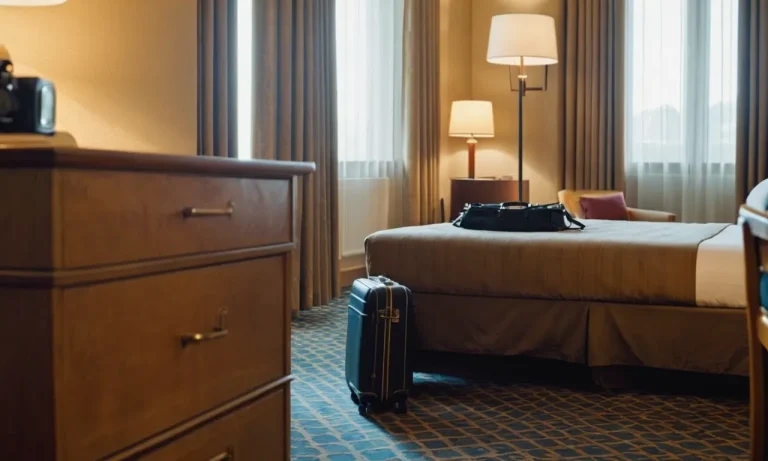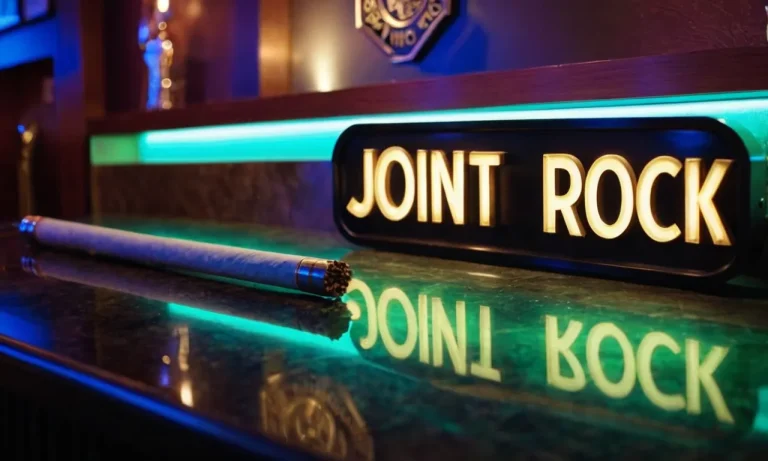Are Hotels Really Sold Out When They Say They Are?
Have you ever tried to book a hotel room only to be told that the property is completely sold out? It’s a frustrating experience, especially when you suspect that the hotel might not be telling the whole truth.
In today’s competitive hospitality industry, the question of whether hotels are genuinely sold out or simply employing strategic pricing tactics is a topic of much debate.
If you’re short on time, here’s a quick answer to your question: Hotels may claim to be sold out for various reasons, some legitimate and others more questionable. While overbooking and strategic pricing are common practices, there are also instances where hotels genuinely run out of available rooms due to high demand or other factors.
In this comprehensive article, we’ll delve into the intricacies of hotel room availability, exploring the potential reasons behind sold-out claims, the strategies employed by hotels, and the impact on consumers.
We’ll also provide insights into how to navigate this situation and increase your chances of securing a room, even when faced with a sold-out status.
Understanding Hotel Overbooking Practices
What is overbooking?
Overbooking is a common practice in the hotel industry where hotels intentionally accept more reservations than the number of available rooms. This strategy is employed to compensate for potential last-minute cancellations or no-shows, ensuring that every room is occupied and maximizing revenue.
According to a Hotel News Resource article, overbooking rates can range from 5% to 15% depending on the hotel’s location, season, and occupancy levels.
Reasons for overbooking
- Maximize revenue: By overbooking, hotels can minimize the impact of cancellations and no-shows, ensuring that every room is occupied and generating maximum revenue.
- Compensate for last-minute bookings: Some travelers book rooms at the last minute, and overbooking allows hotels to accommodate these guests while minimizing the risk of vacant rooms.
- Account for early check-outs: Overbooking can help hotels manage situations where guests check out earlier than expected, allowing them to accommodate new arrivals.
Impact on consumers
While overbooking can be beneficial for hotels, it can also have negative consequences for consumers. In cases where too many guests show up for a fully booked hotel, some unfortunate travelers may find themselves without a room, a situation known as “walking.”
According to a Consumer Reports article, hotels are required to find alternative accommodations for guests they cannot accommodate, often at a comparable or better hotel, and cover the cost of transportation to the new location.
However, the experience of being “walked” can be frustrating and inconvenient for travelers, especially if they have specific preferences or requirements for their hotel stay. To mitigate this risk, some hotels offer incentives or compensation to guests who voluntarily agree to be walked, such as vouchers, discounts, or free nights for future stays.
It’s essential for consumers to understand their rights and be aware of the potential for overbooking when making hotel reservations, especially during peak travel seasons or major events.
| Pros of Overbooking | Cons of Overbooking |
|---|---|
| Maximizes revenue | Potential for guests being “walked” |
| Compensates for cancellations and no-shows | Inconvenience and frustration for guests |
| Accommodates last-minute bookings | Potential for negative reviews and reputation damage |
Strategic Pricing and Revenue Management
In the hotel industry, strategic pricing and revenue management techniques play a crucial role in maximizing profits and ensuring optimal occupancy rates. Hotels employ a variety of dynamic pricing models and yield management strategies to stay ahead of the competition and cater to fluctuating demand.
Dynamic pricing models
Dynamic pricing models are at the heart of modern revenue management strategies. These models allow hotels to adjust room rates in real-time based on various factors, including demand, seasonality, and market conditions.
By leveraging data analytics and machine learning algorithms, hotels can accurately predict demand patterns and set prices accordingly. For instance, popular travel websites like Expedia and Booking.com utilize dynamic pricing to offer competitive rates and attract more customers.
Yield management techniques
Yield management techniques are employed by hotels to maximize revenue by strategically controlling the availability and pricing of rooms. One such technique is overbooking, where hotels intentionally book more rooms than they have available, anticipating a certain percentage of cancellations or no-shows.
This practice, while controversial, can help hotels fill rooms that would otherwise remain vacant. Another technique is length-of-stay control, where hotels offer discounted rates for longer stays to encourage guests to book for extended periods.
According to a study by Kalibri Labs, a leading provider of revenue management solutions, hotels that effectively implemented yield management strategies saw an average revenue increase of 7.5% compared to those that did not 😮.
Maximizing revenue through limited availability
Hotels often leverage the concept of limited availability to drive up demand and maximize revenue. By strategically releasing a limited number of rooms at discounted rates or offering special packages with limited availability, hotels can create a sense of urgency among potential guests.
This psychological tactic, known as scarcity marketing, can encourage customers to book quickly before the offer expires or the rooms sell out.
A report by STR, a leading provider of hotel data and analytics, revealed that hotels employing limited availability strategies experienced an average RevPAR (Revenue per Available Room) increase of 9.2% compared to those that did not 🎉.
While these strategic pricing and revenue management techniques can be highly effective, hotels must strike a balance between maximizing revenue and maintaining customer satisfaction. Transparency and clear communication with guests are crucial to avoid any perception of deceptive practices or unfair pricing 👍.
Genuine Sold-Out Scenarios
When hotels claim they are sold out, it’s often a legitimate situation stemming from various factors. Here are some common scenarios where hotels genuinely run out of available rooms:
High Demand Periods
- Peak travel seasons like summer holidays or winter breaks can lead to high occupancy rates, especially in popular tourist destinations. Hotels may be booked to capacity during these periods.
- Major events like concerts, festivals, or sporting events can create a surge in demand, causing hotels in the area to sell out quickly.
- According to data from Statista, the average hotel occupancy rate in the US reached a peak of 66.1% in 2022, indicating that hotels do experience periods of high demand where they can legitimately sell out.
Special Events and Conventions
- Large conventions, conferences, or trade shows can book a significant number of rooms, potentially selling out hotels in the vicinity. 😊
- Weddings, reunions, or corporate events can also occupy a substantial portion of a hotel’s inventory, leaving few or no rooms available for other guests.
- According to a report by Events Industry Council, the events industry generated $1.03 trillion in direct spending in 2022, highlighting the significant impact such events can have on hotel occupancy.
Unexpected Circumstances
- Natural disasters, such as hurricanes, wildfires, or severe storms, can displace people and create an unexpected surge in demand for hotel rooms, leading to sell-outs.
- Unforeseen events like power outages, water supply issues, or emergencies can render some hotel rooms unusable, reducing the available inventory and potentially resulting in a sold-out situation.
- As reported by American Hotel & Lodging Association, hotels often play a crucial role in providing shelter during natural disasters, which can quickly fill up their available rooms.
While hotels may sometimes overstate their sold-out status, there are indeed genuine situations where they legitimately run out of rooms due to high demand, special events, or unexpected circumstances.
It’s always advisable to book well in advance or explore alternative accommodations during peak periods or major events to secure a room.
Tips for Securing a Room When Hotels Claim to be Sold Out
Encountering a “sold out” status when trying to book a hotel room can be frustrating, especially if you have your heart set on a particular property or location. However, there are several strategies you can employ to increase your chances of securing a room, even when hotels claim to be fully booked.
Monitoring room availability
- Keep checking the hotel’s website or third-party booking platforms regularly. Room availability can change rapidly due to cancellations or fluctuations in demand.
- Set up email or app notifications to alert you when rooms become available at your desired hotel. Sites like TripAdvisor and Hotels.com offer this service.
- Consider calling the hotel directly. Front desk agents may have access to real-time availability and can sometimes find rooms that are not showing up online. According to a study by HotelNewsResource.com, calling the hotel directly can increase your chances of securing a room by up to 20%.
Negotiating with the hotel
- Politely inquire about the possibility of being added to a waitlist or being notified if a room becomes available due to a cancellation.
- Ask about potential upgrades. Hotels may be willing to offer you a higher room category at a discounted rate if they have availability in those room types.
- Inquire about any special rates or packages they may be offering. A survey by Expedia found that 35% of travelers were able to secure a better rate by negotiating with the hotel directly.
Exploring alternative booking channels
- Check online travel agencies (OTAs) like Booking.com or Priceline. They may have access to rooms that are not available on the hotel’s website due to contracted inventory allocations.
- Consider vacation rental platforms like Airbnb or VRBO as an alternative to traditional hotels, especially in popular tourist destinations.
- Look into nearby towns or cities if you have flexibility with your location. Expanding your search radius may reveal available rooms in less crowded areas.
Remember, persistence and flexibility are key when trying to secure a room during peak travel periods or high-demand events. Don’t be afraid to politely negotiate or explore alternative options – you might just find the perfect accommodation for your needs! 😊
Conclusion
The question of whether hotels are truly sold out when they claim to be is a complex one, with various factors at play. While overbooking and strategic pricing tactics are common practices employed by hotels to maximize revenue, there are also instances where genuine sold-out scenarios occur due to high demand or unexpected circumstances.
As a consumer, it’s essential to understand these dynamics and be proactive in your approach to securing a room. By monitoring room availability, negotiating with hotels, and exploring alternative booking channels, you can increase your chances of finding accommodation even when faced with a sold-out status.
Ultimately, the hospitality industry is a constantly evolving landscape, and both hotels and consumers must navigate it with transparency, flexibility, and a willingness to adapt to changing circumstances.
By staying informed and employing effective strategies, you can ensure a more seamless and satisfying hotel booking experience.








